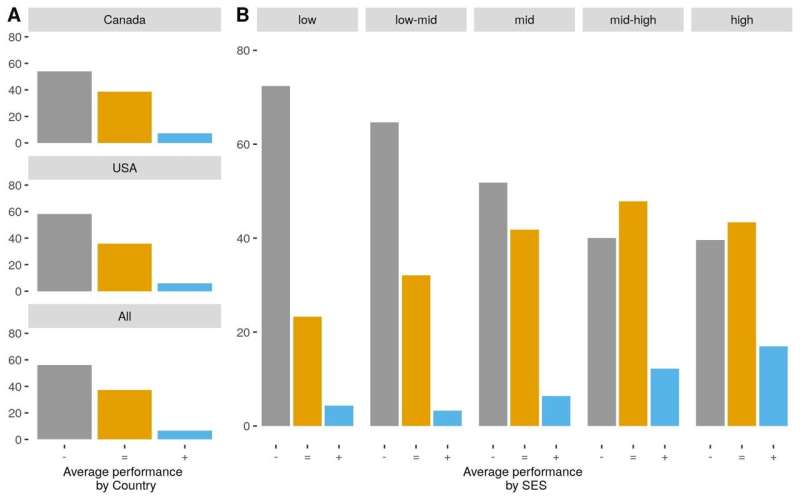This article has been reviewed according to Science X's editorial process and policies. Editors have highlighted the following attributes while ensuring the content's credibility:
fact-checked
trusted source
proofread
Students from low-income households experienced more learning losses during pandemic: Study

A new study from Western researchers examining the impacts of the school closures and remote learning on elementary students during the COVID-19 pandemic has tapped the perspective of a critical group: teachers.
The study found many teachers felt they were less effective in teaching the curriculum through online learning, and observed that students from lower-income households were more likely to experience higher levels of learning losses.
Psychology graduate student Aymee Alvarez-Rivero led the study working alongside Faculty of Education and Psychology professor Daniel Ansari and University of California professor Candice Odgers.
The team found that nearly 65% of teachers observed a drop in class attendance during the 2020–21 academic year and more than 50% saw a decline in academic performance. The researchers noted that the drop in performance was not felt equally across all student populations, with students from low socioeconomic backgrounds more affected by the change.
Of teachers with students from high-income backgrounds, 40% reported drops in performance compared to 70% of teachers with students from low socioeconomic backgrounds. The paper is published in the journal npj Science of Learning.
"We do have learning gaps to close, that is clear," said Ansari. "We have to make sure that the most marginalized and disadvantaged students are being attended to in ways that are culturally sensitive but that also pay attention to the learning losses that they have experienced that may have been disproportionately larger than those of students from relatively higher socioeconomic backgrounds."
According to the findings, students in lower-income households were almost half as likely to have a teacher with previous experience teaching online and half as likely to receive adult support with homeschooling.
According to Alverez-Rivero, the idea of the survey was to provide another source of information on how learning occurred during the pandemic.
"The little evidence we did have about learning during the pandemic was coming from schools that had all the resources to continue standardized assessment online," said Alverez-Rivero.
Together the team developed a questionnaire sent to elementary school teachers in Canada and the U.S. evaluating their experiences with remote learning during the pandemic.
Teachers were asked a series of questions about their students' own experiences and the supports they were getting at home.
"One thing we really wanted to capture was the perspectives of educators themselves because we felt their voices were not being fully represented in the research on the effects of COVID-19," said Ansari.
The study found that more than 50% of teachers felt they were not as effective during remote instruction and that they could not deliver all the expected curriculum.
"We were able to take the survey in a moment that was critical, because it was the end of the first school year that happened fully during the pandemic," said Alverez-Rivero.
For Alverez-Rivero, one of benefits of the survey was showing there was a way to collect data along with traditional standardized evaluations.
"If unfortunately we have to face a similar situation, I think it was a good experience showing we can go through these alternative sources of information to get an idea of what is going on," said Alverez-Rivero.
She says there is more work that can be done with the data they collected and the research team was happy to be able to have the data open to the public.
More information: Aymee Alvarez-Rivero et al, Elementary school teachers' perspectives about learning during the COVID-19 pandemic, npj Science of Learning (2023). DOI: 10.1038/s41539-023-00191-w
Provided by University of Western Ontario




















